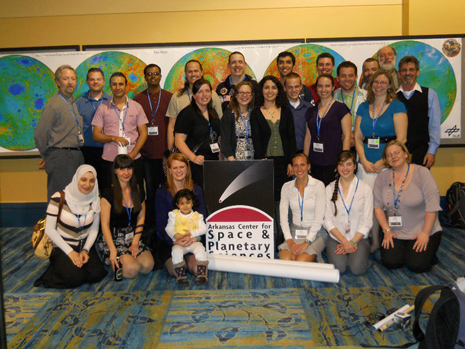
FAYETTEVILLE, Ark. – Students and faculty of the Arkansas Center for Space and Planetary Sciences are preparing for launch. Their destination is The Woodlands, Texas; their mission is another strong showing at the 43rd Lunar and Planetary Science Conference. Thirteen graduate students and three undergraduate students will give a total of 22 presentations, four of which are talks, at the conference, which runs from March 19-23.
Program director Lin Oliver said that the high number of talks and presentations says a lot about the graduate program.
“The fact that we have four of our students selected for talks when even places like Brown, which has one of the top planetary sciences programs in the country, did not have any speaks volumes to the quality of the research and the quality of the students in the center,” Oliver said.
The key is the graduate program’s interdisciplinary approach to research. Students and faculty have many different interests, from astronomy to rocks on Mars to the environments of planets and their moons. With the diverse range of topics, the opportunities to create relevant talks are plentiful.
As all programs do, though, the Arkansas Center for Space and Planetary Sciences has its specialty.
“One of the things we’re very strong in is simulation of planetary environments; not only simulation on the computer but in the laboratory. We’re the only place right now that is getting data simulating Titan conditions. We’ve got the first really good solid set of data. When you have new results in a niche area that no one else is doing, you’re more likely to get an oral presentation as well,” Oliver explained.
Giving a talk in front of people who have been doing research for longer than many students have been alive can be intimidating for graduate students. Patricia Gavin, who will give a talk on modeling of hydrothermal vents on Jupiter’s moon Europa, said that there are tricks to combating the nerves.
“The one thing is if you don’t know the answer, don’t make one up because someone in the audience will call you out on it,” Gavin said. “If you don’t know, say, ‘I don’t know. I didn’t consider that.’ Another thing is, during my first or second LPSC talk, I had everyone from the Space Center spread out in the audience, so I would rotate between them and it looked like I was scanning the entire audience. It helps when you have a large group like Arkansas in that you have a lot of people that can come and support you.”
Having a large number of student talks and poster presentations is nothing new to the Space Center. In 2011, researchers from the program gave seven talks, five by students, and presented 29 posters, five of them by undergraduates.
“The fact that we’re getting four or five talks every year with some consistency speaks to the quality of the research we’re doing and the quality of the grad students and the faculty. We’re doing stuff that’s noteworthy enough that we’re being singled out to give invited talks at the premier conference in planetary science,” Oliver said.
“It definitely speaks volumes for the program that we have such a diverse research group and we’re making such a large showing,” Gavin said.
The Arkansas Center for Space and Planetary Sciences is a graduate program with 30 graduate students and nearly $3 million in awarded grants. Its home is the Field House, which has been in the news recently as a possible location for a new concert hall on campus.
Topics
Contacts
Lin Oliver, director, Arkansas Center for Space and Planetary
Graduate School and International Education
479-575-7625,
William T. Bryan, intern
University Relations
479-575-5555,